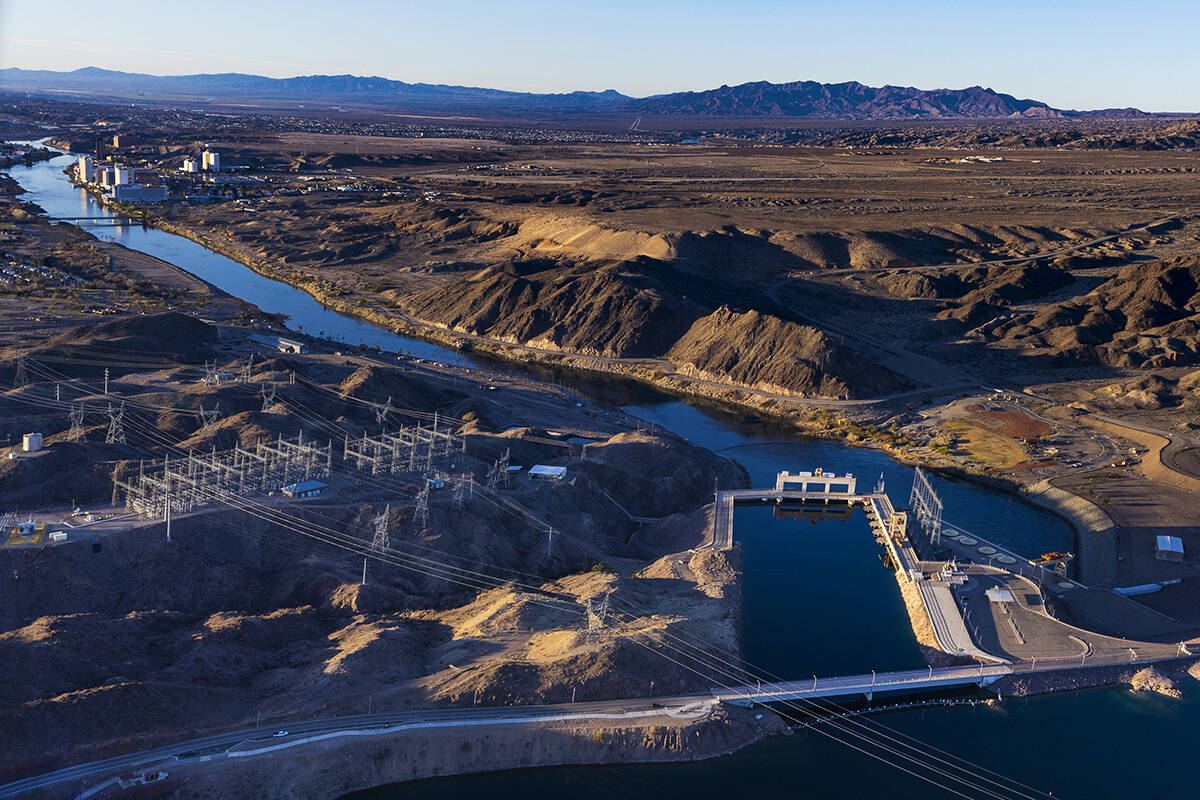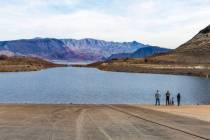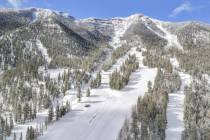From water use to heat islands, Legislature’s mixed bag on environmental bills
Democrats in control of both chambers of the Legislature went into this year’s biennial session with lofty environmental ambitions.
But the 120-day session proved to be more of a mixed bag in the end.
Republican Gov. Joe Lombardo signed into law one of the most significant water conservation bills in years, giving the Southern Nevada Water Authority far more power to restrict water usage in the Las Vegas Valley if things take a turn for the worst along the drought-ridden Colorado River.
He also vetoed several environmental bills, including proposals that sought to limit “forever chemicals” and require heat mitigation planning in Nevada’s two major urban cores of Las Vegas and Reno — the two fastest-warming cities in the country.
But there were far more environmental and conservation-minded bills that never made it out of the Legislature, many dying without ever seeing a vote.
A look at how some of the biggest environmental proposals in the Legislature fared:
Water conservation
One of the most prominent pieces of legislation in the recent session, Assembly Bill 220 gives the Southern Nevada Water Authority the power to restrict single-family residential homes in the Las Vegas Valley to as little as 0.5 acre-feet of water per year, or about 163,000 gallons.
Under the law, the water authority’s board of directors could impose such restrictions if the federal government were to cut Nevada’s annual share of the Colorado River below 270,000 acre-feet. Nevada normally receives 300,000 acre-feet from the river, which accounts for roughly 90 percent of the region’s water supplies.
Water authority officials have said that such restrictions would mostly affect the top 20 percent of single-family residential water users, as roughly 80 percent of single-family homes in the valley use less than 0.5 acre-feet of water per year.
The omnibus water bill also will set up a voluntary program for septic tank owners in Clark County to convert to the region’s sanity sewer system, and gives local municipal water suppliers more say in housing development projects.
Lombardo said in a statement after signing the bill that the law “builds on our efforts to protect sustainable growth on the county and state levels.”
Two other major water bills that would have had major implications for the rest of Nevada — Senate Bill 176 and Assembly Bill 387 — never made it to Lombardo’s desk.
AB387 was seen by supporters as a major step toward fixing Nevada’s growing groundwater problem. The bill would have required the state to use the “best available science” when managing ground and surface water rights conflicts. It also would have provided explicit authority to Nevada’s state engineer to manage separate basins together if water use in one basin would affect water levels somewhere else, such as a separate groundwater basin or in surface waters like streams and lakes.
But after strong pushback from wealthy interests, including mining companies and the developers behind the long-planned Coyote Springs community, the bill failed to move beyond one of the final deadlines in the session.
SB176, sponsored by Sen. Pete Goicoechea, R-Eureka, would have established a program for the state to buy back groundwater rights in areas where there are more claims to water than actual water that exists. The bill died after never receiving a vote.
Heat mitigation
Senate Bill 169 would have required Clark and Washoe counties to adopt heat mitigation plans in their master development plans, such as cooling spaces, public drinking water and urban tree canopies to help alleviate or mitigate the rising temperatures.
A recent study from Climate Central showed that Reno was the fastest-warming city in the country based on average summer temperature changes since 1970, with Las Vegas tied for the second-fastest-warming city.
While the bill garnered bipartisan support in both chambers, Lombardo vetoed the measure because he felt it created more red tape for developers.
In his veto message, Lombardo also claimed “there is no data definitively supporting the proposition that development is causing rising temperatures in either Washoe County or Clark County.”
But Lombardo did sign another measure aimed at urban heat mitigation in Assembly Bill 131. The new law creates an Urban and Community Forestry Program under the state Department of Conservation and Natural Resources and would require the state forester to develop target areas for urban tree canopies.
Another heat-related bill, Senate Bill 427, died during the session. The bill was aimed at providing protections for workers by requiring employers to create heat mitigation programs for days when temperatures eclipse 105 degrees. The bill passed the state Senate on party lines but never received a vote in the Assembly.
Emissions, sustainability
Lombardo signed a pair of bills into law that are aimed at reducing greenhouse gas emissions from vehicles on Nevada roads.
Assembly Bill 184 creates an incentive program for companies to transition to zero-emission medium- and heavy-duty vehicles, and Assembly Bill 262 requires government agencies to give preference to low- and zero-emission vehicles and encourages the use of environmentally friendly fuels like biodiesel.
Senate Bill 76 would have banned the sale and distribution of products that contain intentionally added perfluoroalkyl and polyfluoroalkyl substances, commonly known as PFAs or “forever chemicals,” because the chemicals take thousands of years to break down. Several studies have shown those chemicals to be linked to a number of health issues, including increased risk for cancer and decreases in infant birth weights, according to the Agency for Toxic Substances and Disease Registry.
Lombardo vetoed SB76, saying in his veto message that the measure aimed to “accomplish too much too soon,” and that the state should instead wait for the Environmental Protection Agency to finish developing regulatory recommendations for the chemicals.
Other measures
A pair of environmental justice measures failed to cross the finish line during the legislative session — Assembly Bill 312, which would have created a new advisory commission that would have made policy recommendations relating to environmental justice, and Assembly Bill 71, which would have required the state to conduct an environmental justice study before the 2025 legislative session.
The same goes for Assembly Bill 102, which would have banned wildlife-killing contests, and Assembly Bill 221, which would have closed a loophole in Nevada and allowed the state Department of Wildlife to manage insect and pollinator populations.
Contact Colton Lochhead at clochhead@reviewjournal.com. Follow @ColtonLochhead on Twitter.


























